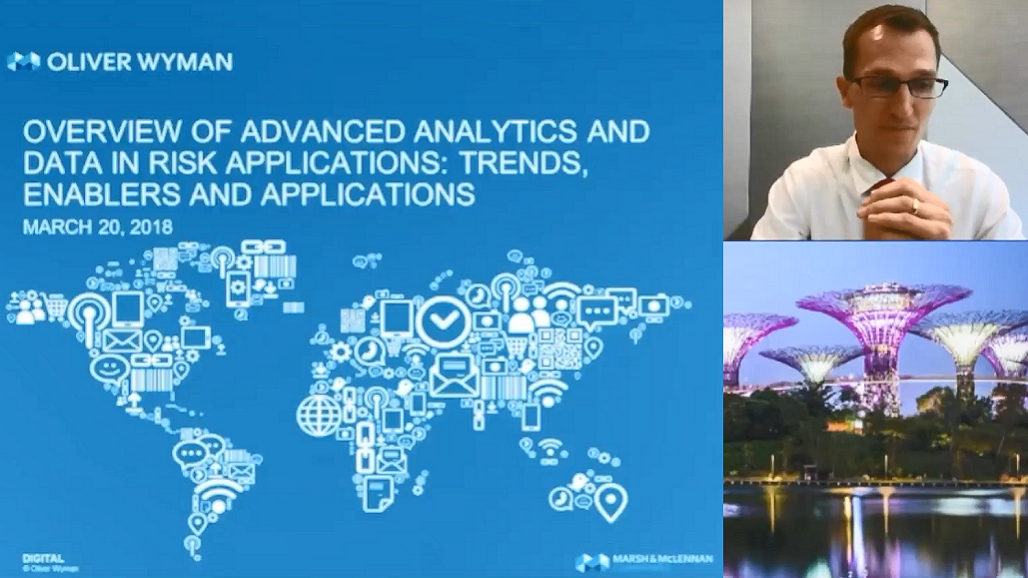Webinar “Advanced Analytics in Risk Management: Trends, Enablers and Applications”
Singapore – The Asian Bankers Association (ABA) invited credit analysts and managers to the webinar on “Advanced Analytics in Risk Management: Trends, Enablers and Applications” held in cooperation with Oliver Wyman – on March 20, 2018.
This second webinar presented by Oliver Wyman’s experts Mikko Lehtonen (Engagement Manager) and Gaurav Kwatra (Principal) from Singapore attracted the participation of over 140 registered participants from 10 Asian countries and over 40 financial institutions.
The webinar elaborated on the issues of Advanced analytics, non-traditional data, natural language processing, together with process digitization, since they present compelling opportunities for risk management. This includes raising productivity, greater insights produced from new technology, and potentially achieving a competitive advantage in a digital world. Although cashing in on a technology dividend in this way presents a compelling prize, it requires wholesale change in current practices. Senior leadership focus and support is critical as multiple functions need to learn new skills and change their habits.
In this session that lasted about an hour, participants were able to delve deeper into the world of advanced analytics and gain an overview of applications of advanced analytics in risk management, illustrated with practical examples. Specifically, they were able to draw insights from the advanced analysis of data in credit applications and engaged the guest experts speakers in a Q&A session that last some 20 minutes.
PRESENTATION FILE
Participants can download the Presentation’s PDF file from HERE.
TEST QUESTIONS
The complete take-home test’s questions are presented at the end of this article. The test is due March 27, 2019.
CERTIFICATE OF PARTICIPATION
ABA informed that all registered participants that deliver the test’s questions on time will receive the ABA-issued Certificate of Participation.
Take-Home Test – Due date: March 27, 2018
(1) Please evaluate the mid-term (3y) business value potential of the following technology-related enables for your bank’s risk department (Scale: 1 = Very little or no value, 5 = Significant value)
(a) More advanced analytical techniques (e.g. ML)
(b) AI
(c) Non-traditional data sources
(d) RPA
(2) What would be the key value drivers that you would expect to obtain from the adoption of advanced analytics techniques (e.g. machine learning techniques)? (Please rate following in scale of: 1 = Very little or no value, 5 = Significant value)
(a) Increase in the predictive power of models in general
(b) Ability to extract additional insights from existing data in general (i.e. value that is additional to the increased predictive power in point above)
(c) Ability to create models where the data is unstructured (and previous techniques are thus insufficient/not applicable)
(d) Ability to create models where there is too much data (and previous techniques are thus insufficient/not applicable)
(e) Faster time to create models due to migration to an updated platform/environment
(f) Creation of self-learning models that can be updated with only limited human oversight
(g) Application of natural language processing techniques in risk applications
(h) Higher degree of automation in resulting applications, e.g. in form of RPA
(i) Other (if any): ___________________
(3) Please name which advanced analytics applications you think have the highest business value potential for your bank’s risk department in
Short term (1y): ____________________
Mid-term (3y): ____________________
Long-term (5y): ____________________
(4) What’s currently preventing your bank from extracting value from these technologies? (please mark all that apply)
(a) Nothing – we’re moving ahead as fast as we feel appropriate
(b) No clear business case demonstrated
(c) Business case is clear but not attractive (too costly / benefits too small)
(d) Bad data quality
(e) Too little data
(f) Insufficient infrastructure support (e.g. data pipes, system integration)
(g) Lack of skills in data science (e.g. machine learning)
(h) Lack of skills in software engineering (e.g. creation of applications)
(i) Lack of skills in business transformation (e.g. process redesign, change management)
(j) Other priorities prevent progress in this field
(k) Current culture
(l) Regulator’s concerns
(m) Other? ____________________
(5) Is improvement of business through analytics a strategic priority for your bank (e.g. has senior management articulated this as priority)? (Yes/No and elaborate)
(6) Is process automation a strategic priority for your bank (e.g. has senior management articulated this as priority)? (Yes /No and elaborate)
(7) Have you developed internal capabilities to monitor and maintain ML based models? (Yes/No and elaborate)
(8) Does your bank have concrete action plans to build further capabilities for advanced analytics? If yes, what?
(a) Within the next 12 months? _____________
(b) Beyond 12 months? ___________________
(9) Which platforms do you plan use for development and deployment of machine learning based models? (please mark all that apply)
(a) Hadoop
(b) Python
(c) R
(d) SAS
(e) Anything else? _______
(10) Any other comment or question to the presenters?
These were the two presenters:
 Mikko Lehtonen – Engagement Manager, Oliver Wyman
Mikko Lehtonen – Engagement Manager, Oliver Wyman
Mikko is an Engagement Manager in the Finance and Risk practice in Oliver Wyman’s Singapore Office since 2014, having also worked for 4 years in Oliver Wyman’s Zürich office. Mikko has experience in consulting to leading financial institutions in Europe and Asia. During his projects, Mikko has focused on the development of quantitative risk management capabilities for his clients.
Past project experience (examples):
- For a leading national bank in South-East Asia, Mikko led a credit rating model development project that was the cornerstone of the bank’s Basel II Programme, including end-to-end development of IRB PD models for the bank’s SME and Corporate segments.
- For a regional bank in South-East Asia, he led a credit rating model development for a Large Corporate Corporate segment.
- For a regional Asian bank, he was responsible for the development of a managerial stress-testing toolkit, including the customization of a reference Oliver-Wyman toolkit for the client, improving client’s risk capabilities
- For a global bank, Mikko was responsible for the local deployment of a top-down stress testing framework in two countries, including customization and parameterization of the toolkit, running a proof-of-concept of the full framework, and handover to users
- For a governmental authority, the project team stress tested the distressed national banking system to identify capital shortfalls and additional capital needs
Mikko holds an MSc (tech) from Helsinki University of Technology and a PhD in Management, Technology and Economics from ETH Zürich. His MSc Thesis focused on artificial intelligence. He is fluent in English, German, French and Finnish. He joined Oliver Wyman in 2010.
 Gaurav Kwatra – Principal, Oliver Wyman Labs
Gaurav Kwatra – Principal, Oliver Wyman Labs
Gaurav is a Principal in Oliver Wyman’s Singapore office. Gaurav joined the firm in 2010. Prior to joining Oliver Wyman, Gaurav was leading the Marketing Analytics for a credit-card segments of a leading US bank. Within Oliver Wyman, Gaurav has worked with a range of clients focusing on quantitative analytics to drive business decisions in the banking space.
Selected project experience with Oliver Wyman include:
- Development / review of predictive models for more than a dozen financial institution globally. Work primarily focused on Southeast Asia including Singapore, Malaysia, Indonesia and Thailand. Work has ranged from key business segments. (Retail, SME, Mid Market, Wholesale, Financial Institutions and Private Banking)
- Development of business-decision frameworks incorporating the outputs of predictive models, including marketing, underwriting, pricing and strategic planning.
- Development of associated processes and systems infrastructure embedding the models in business decision making.
- Development of stress-testing models for multiple institutions, leveraging a multitude of internal and external data.
Gaurav holds an MBA from INSEAD and a B. Tech. in Computer Science and Engineering from the Indian Institute of Technology, Delhi.


Leave a Reply